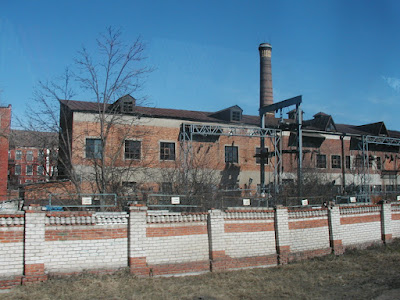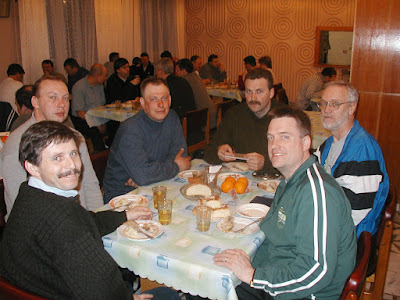Back at the Mission Center on April 7th, after our morning at the orphanage, we had a "Russian lunch" -- salmon soup with potatoes and carrots, bread, followed by circular pasta and tiny meat loaves that might have been sausages. And very hot tea instead of very hot coffee. No yogurt, sadly. I was getting used to it, but there you are.
We boarded the bus at 1 for a trip out of town.
We traveled for an hour and a half through incredible countryside, seeing monasteries, old churches, even some famous ones none of us had ever heard of -- all at some distance. That the countryside is filled with this historic evidence of Christianity is evident everywhere.
We saw huge fields where farmers were burning off detritus from last growing season, smoke drifting toward the horizon. Here and there, many old-style villages -- two rows of facing wooden houses on either side of a dirt road, many of the houses painted bright blue or green. And the famous birch forests that I have read about in Russian novels.
We traveled on a two-lane road, rough as rough, dodging potholes when possible. At one point we saw police around a car accident -- a truck had bumped into a small car, rear-ended it. The presence of police on the highway created a great deal more interest on the bus than pastoral landscapes and ancient villages that held my attention. Perhaps we were looking for some signs of confrontation, but there were none.
We turned off the main
highway onto another road that led through a very primitive town, on
toward Kovrov, a city used for high security industry during the Soviet
era.
We played our basketball games in a munitions plant on the nicest floor we had seen to that point. The boys played tough once again, winning by one point in overtime. There were lots of spectators, especially kids. The Dads played a better game overall than our first one although we still lost by 13 or 14 points. I noted for posterity or, perhaps, to revive my shrinking hopes for basketball respectability, that I scored 7 points. Thus, the high point of my international athletic career.
Then both teams climbed onto our bus for a short trip down tiny lanes to a restaurant. John Horton and I were joined by Andrew, our interpreter, and the three big players (center, two forwards) -- Yuri, Mikhale, and Sergei.
We asked about each other's occupations, man-talk as it were. When John said he was a pastor, Yuri started asking him questions with Andrew interpreting. Before long John had shared his testimony, John Wesley's testimony, and the plan of salvation. It was amazing.I managed a halting conversation with Sergei, who spoke as much English as I spoke Russian. As we got up to leave Sergei gave both John and me a coin from the old Soviet Union. The coin showing Lenin with right arm raised in that pose familiar to everyone from that era was well worn on the front side as if it had been rubbed repeatedly with a thumb. I don't know if these coins were or had been in common circulation. What it cost Sergei to part with this coin, I can only imagine; but as a gesture of friendship it was unmistakable and touching.
As our bus began to move back toward Vladimir through the dark, dark countryside, we were asked to move toward the back for team time, leaving our Russian translators and organizers in front behind the driver to have their own conversations. As we sang a couple of hymns at the end of our team time, two of the Russians -- Alexander, our contact with teams in Kovrov, and Oxana, a university professor -- came back to sit near us.
When we stopped singing, Oxana stood and said, "Can you sing more?"
So we sang more, maybe 8 or 10 hymns and songs of the faith, often singing three or four or five verses of each if someone knew from memory how the next verse started. All of the us Dads (churched fathers) and many of the boys knew these songs well from years of singing them in church. Many of us knew harmonies as well, so the singing took on a richness as if we had been singing together for decades. Singing them acappella, in the dark, in this unplanned way as the bus bounced along, was a uniquely moving experience for many of us. As had happened earlier at our visit to the orphanage, I was aware of how profoundly my world was being enlarged, and I was extraordinarily grateful for God's goodness.
I don't know what this experience meant to our Russian companions, but when we ran out of time or ideas or songs and the bus grew quiet again, Oxana stood again and said "thank you, please."








No comments:
Post a Comment